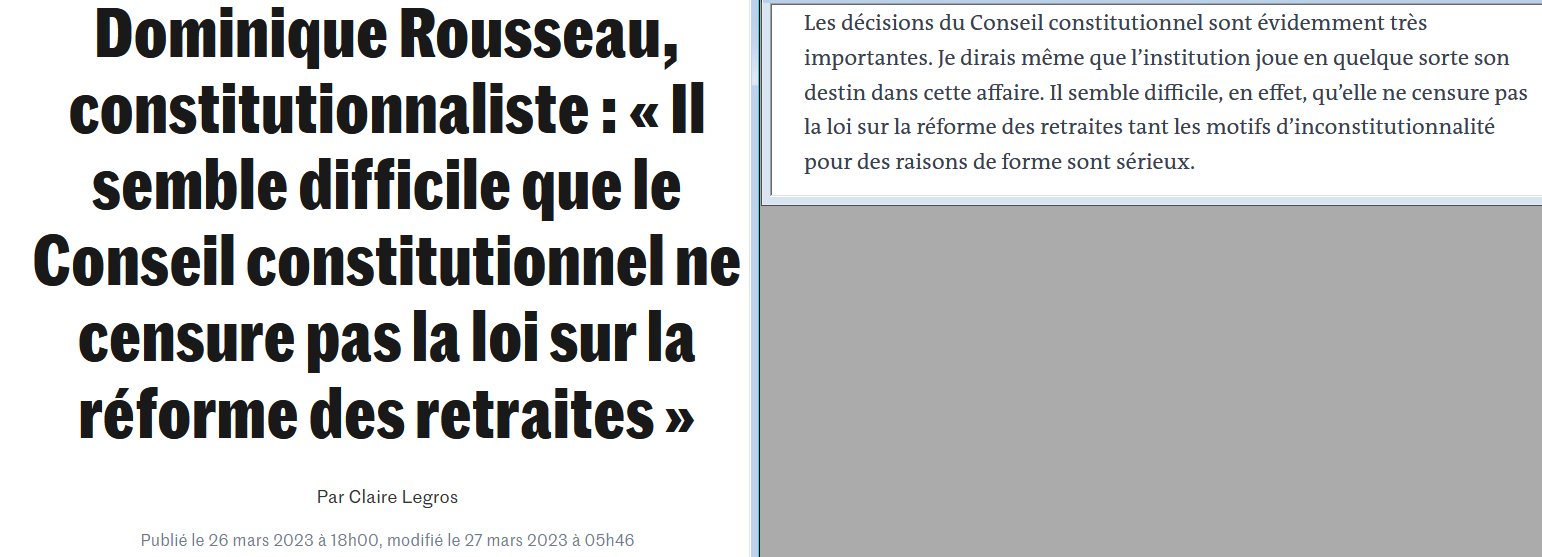Un chef d’état donne une conférence de presse ; par exemple Emmanuel Macron, président de la république française, le 17 avril dernier. Les journaux publieront des commentaires louangeurs ou critiques, mais en premier lieu, si ce sont des journaux d’information, ils rendront compte de ce qui a été dit. Leur manchette sera du genre de celle du Guardian ce jour-là :

Dans ses autres articles et éditoriaux le Guardian, très à gauche et très remonté contre Macron, ne se gêne pas pour exprimer ses critiques. Mais il commence par faire son travail d’information : M. Macron a donné tel jour une conférence de presse sur tel thème, il a expliqué ceci et annoncé cela. Quelle différence avec le quotidien autrefois « de référence » dans le pays même de Macron, Le Monde. Inutile en « une » de chercher à s’informer sur l’exposé ; à la place, le lecteur a droit à l’opinion des journalistes, un arrêt définitif et cinglant :

Ce qu’il a dit ? Quels sont ces chantiers ? Mystère. Et aucune importance. Sans doute le lecteur serait incapable de former sa propre opinion sur la nouveauté, ou non, des annonces de Macron. Ou il y perdrait trop de temps. Les grands experts du Monde lui évitent cette fatigue en interprétant pour lui le discours, plutôt que de le décrire. Tout ce qui compte est leur jugement.
Jour après jour, au lieu d’informer, Le Monde mène une campagne de démolition du gouvernement actuel qui n’a rien à envier aux plus beaux (ou mauvais) jours de l’Humanité d’antan. Cantonons-nous à quelques exemples pris au hasard dans le mois d’avril 2023, reflétant comment un quotidien autrefois sérieux compose aujourd’hui ses Unes. Le 5 avril, le gouvernement ayant annoncé vouloir dissoudre un groupuscule violent, « Les Soulèvements de la Terre », responsable de millions d’euros de destructions et déprédations les mois précédents et cherchant en permanence l’affrontement avec les forces de l’ordre, voici ce que Le Monde trouve de mieux à titrer :

Aucune nuance, aucun recul. Le terme « méga-bassine » est lui-même tendancieux. Il s’agit d’une réserve d’eau, destinée à préserver cette ressource pour faire face aux étés de plus en plus chauds que nous connaissons. On peut être pour ou contre mais force est de noter que dans aucun autre pays d’Europe occidentale ce genre de discussion ne passe par des émeutes d’une telle violence (47 gendarmes blessés ce jour-là). La « bataille » principale n’est pas celle des arguments mais une bataille au sens propre entre les forces de l’ordre et des extrémistes déchaînés. Rien de tout cela dans le titre et le résumé, seulement l’annonce que le mouvement a « réfuté point par point » — la cause est entendue et jugée ! — les raisons du gouvernement. Comme s’il s’agissait d’une aimable discussion d’idées (où l’un des partenaires a raison par définition) et non du contrôle d’une organisation subversive (contestable ou non, la décision de construire la réserve a été votée par les pouvoirs régionaux normalement élus).
Le titre publié deux jours avant est lui, plutôt amusant dans son obsession critique :

Populiste en plus de ses autres tares, il est le représentant de la Noblesse d’État ! Ah tiens, François Hollande, que Le Monde traita toujours avec de grands égards, n’en était pas, lui ? Fils de médecin, élevé à Neuilly, ancien élève de Saint-Jean Baptiste de la Salle puis HEC, Sciences Po et l’ENA, ayant commencé sa carrière à la Cour des Comptes, ensuite militant et responsable politique pendant toute sa carrière, oui, Hollande est de gauche, donc c’est le Peuple, le vrai ! Et Macron l’affreux représentant du Système.
Mais ne nous inquiétons pas trop, dans ce cas précis il s’agissait d’une « Tribune », présentée comme telle. Revenons à l’information, ou plutôt ce qui devrait en être. Le 10 avril Le Monde traite en Une d’écologie, sujet que vous croyez peut-être sérieux mais sur lequel votre quotidien préféré choisit son parti — comme Pierre Dac et Francis Blanche, le parti d’en rire :

Absolument. Rien de sérieux dans ce gouvernement, tout ce qu’il fait, quand ce n’est pas scandaleux, doit être risible. Le lendemain on revient au scandaleux :

Si Macron voulait vraiment « étouffer » quelque chose, bonne chance dans un pays où les moyens d’information de masse (Le Monde n’étant que l’un d’eux) sont ligués contre lui. (Note lexicale : « peuple » tel qu’employé ici est une abréviation pour « émeutiers et incendiaires ». Quant à la « légitimité » des syndicats, parlons-en : 10% des salariés français sont syndiqués, moins de 8% dans le privé et, même dans le secteur public, moins de 20%. En outre, de quels « syndicats» s’agit-il au juste ? Dans les autres pays, les salariés d’une entreprise ou d’une branche se groupent en un syndicat pour défendre leurs intérêts. Un seul syndicat, bien sûr. En France, il y a 4 ou 5 syndicats rivaux dans une même entreprise, petits partis politiques subventionnés se disputant les voix des quelques votants.)
Le 13 avril, un point vraiment lumineux sur la situation :

Nulle trace de ce que le supposé sentiment d’injustice et de colère n’est le fait que d’une partie de la population, chauffée à blanc par les extrémistes de gauche et de droite. Quant au 49.3, il est difficile de voir en quoi ce mécanisme prévu par la Constitution —précisément pour les cas difficiles, comme celui-ci, où une partie de la droite classique a été intimidée voire terrorisée par les menaces reçues de toute part — est injuste ou prompt à susciter la colère. Il est après tout sujet à un vote de défiance (qui a eu lieu et a échoué). Du reste ce mécanisme a été surtout utilisé par la gauche sous Mitterrand: 3 fois par Pierre Bérégovoy, 8 fois par Édith Cresson et 28 fois par Michel Rocard (vingt-huit fois !). Je n’ai pas souvenir que lors de ses 6 utilisations par Manuel Valls, sous Hollande, Le Monde ait crié à l’injustice et compati à la légitime colère du Peuple. Ce qui frappe dans ce titre c’est une fois de plus le matraquage quotidien : le scandale et la malfaisance sont toujours du même côté, et l’injustice subie et la colère justifiée toujours de l’autre.
Le 13 avril, suite des grèves à répétition. Un journal même minimalement soucieux de la vie quotidienne de ses lecteurs parlerait des complications incessantes, des attentes interminables dans les gares et aéroports, des trésors d’invention auxquels sont réduits ceux qui doivent faire garder leurs enfants, des nouvelles pertes colossales pour l’économie du pays, de l’annulation de la première visite d’État que le nouveau roi britannique avait choisi de réserver à la France. (D’avoir peu d’admiration pour la monarchie actuelle et encore moins pour l’Angleterre du Brexit n’empêche pas de ressentir la gifle monumentale qu’a constituée cette annulation.) Non, il ne s’agit que des luttes glorieuses du Peuple en révolte :

Intransigeance ? Qu’attend-on au juste : qu’un gouvernement élu sur la promesse d’une réforme et l’ayant fait passer au Parlement décide tout à coup de l’annuler ? Peut-être pour rassurer les Libraires en Colère (si l’on devine correctement le mot tronqué sur la photo de banderole) ? Cette Une du Monde et des dizaines d’autres comme elles sont de purs appels à manifester ; jour après jour le journal explique aimablement à ses lecteurs quant et où participer. Comme s’ils n’avaient rien de mieux à faire.
Le même jour, un autre sommet de l’élite intellectuelle éclairant le monde :

En d’autres temps Le Monde était attaché aux principes constitutionnels. Notez l’illustration menaçante. Côté constitution, avec sa sagacité habituelle le journal avait annoncé dès le 26 mars ce qui allait se passer :

Les opposants à la réforme, ayant perdu à toutes les étapes, se rattachaient à l’espoir que le Conseil Constitutionnel annulât tout. Bien entendu il n’avait aucune raison de le faire. Son rôle n’est pas de substituer la volonté des manifestants du jour à celle du Parlement élu. Peut-être y jouait-il « en quelque sorte son destin » mais aux dernières nouvelles il existe encore. Le 26 mars il pouvait encore y avoir débat, mais un journal objectif et sérieux aurait publié une analyse factuelle et prudente.
Tout cela n’empêche pas Le Monde de continuer de tirer sur tout ce qui bouge du côté du gouvernement. Le 21 avril, Macron ayant rencontré des enseignants :

Si quelqu’un crispe, il semblerait que ce soit plutôt Le Monde, mais bon. Ce qui compte, bien sûr, ce ne sont pas les avancées forcément viciées du gouvernement mais la réaction des 18,4%, les syndicats. Conjecture oiseuse : s’il n’y avait pas eu le « pacte enseignant », est-ce que plus rien n’aurait « terni » la joie débordante desdits syndicats et leur soutien désormais enthousiaste aux projets éducatifs du gouvernement ?
Après le passage de la réforme des retraites (au grand soulagement de beaucoup), Macron et Borne ont annoncé vouloir continuer avec les réformes. Quel dommage, selon Le Monde, qu’ils soient en situation si difficile ! Le 24 avril, pauvre Macron :

Pour Borne ce n’est pas mieux (26 avril) :

À ce point d’affaiblissement rien ne pourrait être pire, mais si, on peut s’affaiblir encore :

Le 1er mai, reportage sur les manifestations, dans le même genre que les précédents, par exemple :

Le « mais » est vraiment adorable. Un« mais » dans le style bien connu de « je ne suis pas raciste, mais… ». En réalité, depuis des mois (et dès la crise des gilets jaunes) Le Monde affiche une attitude de compréhension presque affectueuse vis-à-vis des pires excès. Macron, pour qui l’écoute, n’est en rien méprisant et son attitude est le contraire de celle de quelqu’un qui prendrait les gens pour des imbéciles. Ses discours sont de très haute tenue (comme l’étaient, du reste, ceux de François Hollande) ; il explique et il justifie. Ne se sentent méprisés que ceux qui en réalité le méprisent, pour des raisons qu’on n’a pas de mal à imaginer (il est passé par la banque Rothschild , comme Pompidou du reste, il parle bien, il joue du piano, il n’a pas besoin de « prendre de haut » pour qu’on détecte en lui le premier de la classe). Et d’ailleurs s’il l’était, méprisant, en quoi cela justifierait-il de mettre le feu à la brasserie La Rotonde ? Dans les pays développés seule la France est en proie à ces manifestations régulièrement violentes qui dégénèrent. Les activistes du Monde n’ont rien à y redire ; il préfèrent réserver leur indignation pour ceux qui essayent de moderniser le pays.
La rage anti-Macron et anti-Borne se déchaîne jour après jour dans ce qui fut le quotidien respecté de Beuve-Méry et (malgré ses défauts) une source d’informations souvent fiables et de commentaires pondérés. Il semble avoir été pris en otage par une poignée de propagandistes peu soucieux de journalisme. On voit bien que les éléments les plus responsables en sont gênés ; Sylvie Kaufmann publie dans le New York Times des analyses raisonnées et raisonnables, Françoise Fressoz écrit des éditoriaux équilibrés. On se demande si c’est pour maintenir une façade respectable pour les lecteurs étrangers qui ne voient pas le déferlement quotidien de bile anti-Établissement remplaçant l’information de base.
Dommage vraiment qu’on en soit venu là. Je ne sais pas ce qu’on enseigne aujourd’hui dans les écoles de journalisme en France, mais tous les autre grands pays démocratiques ont leurs journaux de référence qui appliquent (ou essayent d’appliquer, avec d’inévitables ratés) la distinction fondamentale entre nouvelles et opinions. Que faudrait il pour que les lecteurs français aient à nouveau un journal sérieux, objectif et crédible ?
VN:F [1.9.10_1130]
Rating: 10.0/10 (2 votes cast)
VN:F [1.9.10_1130]

















 Informatics Europe
Informatics Europe LASER summer school
LASER summer school Propulsion Academy
Propulsion Academy